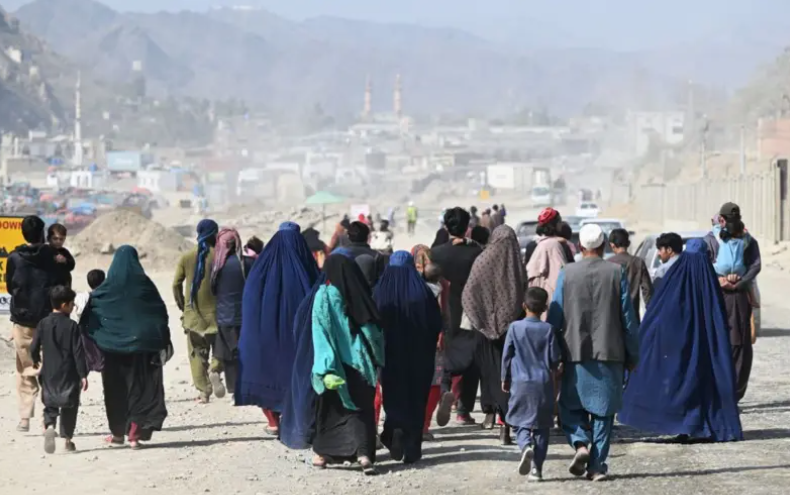A group of UN experts has called on Pakistan to abandon plans to forcibly expel Afghan refugees from Islamabad and Rawalpindi and to ensure that these refugees are not coerced into returning to Afghanistan.
In a statement, the group of experts associated with various UN agencies said: “We urge Pakistan to immediately halt the forced displacement, expulsion, detention, and intimidation of Afghan nationals within the country, and not to force them to return to Afghanistan.”
This group includes Richard Bennett, the Special Rapporteur on the Human Rights Situation in Afghanistan, Siobhan Molale, the Special Rapporteur on Human Trafficking, especially concerning women and children, and several other officials from human rights organizations. These Special Rapporteurs, independent experts, and their working groups are part of the UN Human Rights Council.
The UN statement mentioned that the deadline for Afghan refugees to leave Pakistan was set for March 31, but it may be extended until April 10. However, many Afghan refugees living in Pakistan have already shared their concerns with UN experts.
The statement further said: “The greatest harm could affect Afghan women, girls, LGBTQ+ individuals, ethnic and religious minorities, former government and security sector personnel, human rights activists, and media workers.”
It was also noted: “Children, especially those without guardians, are at risk of trafficking, forced marriages, or abuse, and persons with disabilities or elderly individuals may also be at risk of harm.”
“No Refugee Has Been Arrested So Far”
Reports indicate that Afghan refugees are being detained, transferred to police stations, and deported to Afghanistan from various regions in Pakistan.
BBC reporter Shehzad Malik reported that activities to expel Afghan refugees have intensified in Islamabad and Rawalpindi, along with other cities in Pakistan.
According to local police, more than 50 Afghan refugees have been arrested, who were carrying Afghan citizen cards.
Local police mentioned that families holding Afghan citizen cards would also be sent to special refugee camps before being deported to Afghanistan.
Official figures from Pakistan show that 2.1 million Afghan refugees, both registered and unregistered, are residing in Pakistan.
There have also been reports of Pakistani police harassing refugees, with some claiming that they are registered refugees but being threatened with deportation to Afghanistan while being extorted for money.
Meanwhile, Peshawar and Khyber Police Chief Qasim Ali Shah told BBC that no Afghan refugee has been arrested so far.
He added that so far, only those Afghan refugees who have voluntarily chosen to leave Pakistan are being sent to Afghanistan.
He also stated that any Afghan refugee being harassed by the police should file a complaint.
Earlier this week, officials from Khyber Pakhtunkhwa said that 40 more Afghan refugees, who only had Afghan citizen cards, were deported via the Torkham border.
The statement mentioned that a total of 193 Afghan refugees holding Afghan citizen cards have been deported, and a total of 470,722 refugees have been sent to Afghanistan via Torkham.
Official figures show that 8,953 refugees were sent from Khyber Pakhtunkhwa, 1,309 from Punjab, 1,561 from Islamabad, 38 from Pakistan-administered Kashmir, and 44 from Sindh.
So far, a total of 477,434 refugees have been deported from Khyber Pakhtunkhwa to Afghanistan.
Meanwhile, UN experts stated in their latest statement that many Afghans who moved to Pakistan had been given credible promises of resettlement in a third country, hoping for a secure future, but due to the suspension of resettlement programs, they are now facing an uncertain future.
The UN experts also warned that with the cessation of financial assistance, it will be difficult not only for Afghan authorities but also for humanitarian organizations to manage and support such a large number of refugees from neighboring countries. They have called on the international community to support a long-term solution for the issue of Afghan refugees, considering the human rights situation in Afghanistan.









